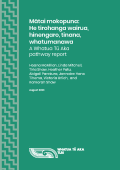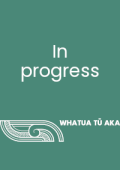
The TLRI’s Whatua Tū Aka research funding pathway seeks to improve equity for Māori learners by supporting kaupapa Māori educational research and building kaupapa Māori research capability. It was established in 2020.
In recent years, the TLRI has prioritised funding of research that focusses on success for Māori learners as Māori in any sector, as well as research on topics of strategic importance within the early childhood education, primary and/or secondary school sectors.
At the bottom of this page you can find kaupapa Māori research funded through Whatua Tū Aka.
Other TLRI research may also be of relevance or interest. Explore our archive of All projects funded by TLRI, or search keywords at the top of the page.
Ngā Mātāpono | Principles
E rima ngā mātāpono e whakaruruhau ana i Whatua Tū Aka: Ko te Kaupapa Māori, Rangatiratanga,
Whanaungatanga, Ako me te Mana. Kia kitea nuitia ēnei ariā tūhonohono me te taupuhipuhi puta noa i tō tono.
There are five principles underpinning Whatua Tū Aka research: Kaupapa Māori, Rangatiratanga, Whanaungatanga, Ako, and Mana. These connected and interdependent concepts should be evident throughout your proposal.
Kaupapa Māori
Kaupapa Māori
Ka noho mai ko te Kaupapa Māori hei mātāpono tāhuhu mō Whatua Tū Aka. Ka taunakitia a Kaupapa Māori i te mana o te reo, ngā tikanga me te mātauranga Māori. Me aronui tō kaupapa rangahau ki tētahi aronga Kaupapa Māori mai i te tirohanga Māori hoki e whakaputa ai he hua mō ngā wheako a te Māori i roto i te mātauranga.
Ko ngā tono rangahau mō te Māori, mā te Māori, nā te Māori. E akiaki ana a TLRI kia whakaputa koutou i ngā tūmomo āhuatanga e whakaatu ana i te kaupapa Māori pērā i ngā āhuatanga ā-whānau, ā-kura, ā-hapori, ā-hapū, ā-iwi.
Kaupapa Māori is the overarching principle for Whatua Tū Aka research projects. Kaupapa Māori assumes the validity and legitimacy of te reo, tikanga, and mātauranga Māori.
Whatua Tū Aka research projects have a strongly articulated kaupapa Māori focus and approach that will have a transformative impact on the educational experiences of Māori. Proposals must be for research that is by Māori, for Māori, with Māori. The TLRI encourages nuanced and diverse expressions of kaupapa Māori e.g., ā-whānau, ā-kura, ā-hapori, ā-hapū, ā-iwi.
Rangatiratanga
Rangatiratanga
Ka whakawhenutia te Rangatiratanga ki roto i tō tono mā tō āta whiriwhiri i ngā miro o te rangahau e meatia ana mō wai, mā wai hoki e kawe. Ka kitea nuitia te Rangatiratanga i roto i tōna hanga kaupapa mahi tahi e whakatau i ngā tikanga me ngā tukanga i waenganui i ngā kairangahau me tōna hapori. Me whakaatu mai tō tono me pēhea tō rangahau e hāpai ai i te rangatiratanga e hāngai ana ki ngā tikanga, kawa me te horopaki o te hau kāinga.
Rangatiratanga will be embedded in your proposal through your consideration of who the research is for and who initiated it. Rangatiratanga will also be evident in the project’s co-design and in the shared decision-making processes that exist between researchers and the community of interest. Your proposal should describe how your research will uphold rangatiratanga and be responsive to local tikanga, context, and kawa.
Whanaungatanga
Whanaungatanga
Ko te whanaungatanga e pā ana ki ngā hononga whai mana, taupuhipuhi anō hoki. He tohu anō tēnei i te haepapa me te ūkaha o te kairangahau ki a rātou anō i roto i te tīma me tōna ake hapori. Me whakaatu mai i roto i tō tono ōu whanaungatanga ki waenganui i te hapori e rangahaua ana e koe, ā, ko te wairua o te whanaungatanga i te wā o te rangahau, ā, haere ake nei.
Whanaungatanga is about meaningful and reciprocal relationships. It acknowledges the responsibility and
commitment researchers have to each other in the research team and to the community of interest. Your proposal should describe the nature of your existing relationship with the community of interest, as well as the nature of that relationship during the research, and into the future.
Ako
Ako
Ko te Ako te tino iho o te TLRI. Ko ngā kaupapa katoa he mea ako me te whakaako. I roto i te horopaki o TLRI, me whakaatu mai te ako mā roto i te:
- āhua o ngā tikanga rangahau, hei tauira, mā te āta whiriwhiri i te whanaungatanga ki waenganui i ngā tuākana-teina e tīni ai i ētahi wāhanga o tō kaupapa rangahau
- ō mahi whakawhanake i ngā kairangahau e tīmata nei i roto i ēnei mahi, ngā kairangahau hou rānei, me ētahi atu i roto i te hapori whai pānga
- ō mahi tohatoha i ngā whakakitenga o tō rangahau.
Ako is the essence of the TLRI. All projects are about teaching and learning. In a TLRI context, ako needs to be demonstrated in:
- how the research is undertaken, for example, through consideration of tuakana-teina relationships that will change across the team at different stages of the project
- your approach to building the capability of emerging or new researchers and others in the community of interest
- your approach to the dissemination of research findings.
Mana
Mana
Ko tēnei mātāpono e whakanui ana i te mana o te tamariki, whānau, kura, hapori, hapū, me ngā iwi. Me whakaatu mai e koe i roto i tō tono rangahau me pēhea tō kaupapa e hāpai ai i te mana o te katoa. Me āta whakamārama mai koe i roto i tō tono he pēhea tō kaupapa rangahau e whakapiki ake ai i te ora o ngā tāngata i roto i tō kaupapa rangahau. Me whakaatu hoki tō kaupapa kua āta whiria e koe ngā take matatika mātāmua, ka pēhea hoki tō whakahaere i aua take.
This principle acknowledges the mana of tamariki, whānau, kura, hapori, hapū, and iwi. Your proposal should
demonstrate how your research will uphold the mana of all involved. Your proposal should articulate how your
project will seek to leave people in a better place as a result of their participation in the research. Your proposal
should also demonstrate that you have considered key ethical issues and how these will be managed.



